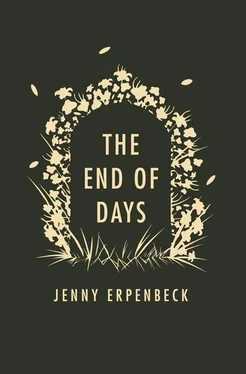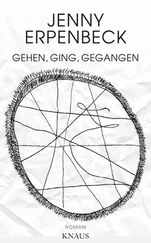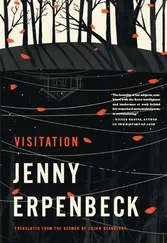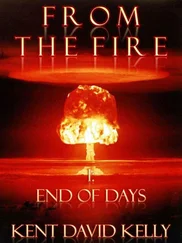Jenny Erpenbeck - The End of Days
Здесь есть возможность читать онлайн «Jenny Erpenbeck - The End of Days» весь текст электронной книги совершенно бесплатно (целиком полную версию без сокращений). В некоторых случаях можно слушать аудио, скачать через торрент в формате fb2 и присутствует краткое содержание. Год выпуска: 2014, Издательство: New Directions Publishing, Жанр: Современная проза, на английском языке. Описание произведения, (предисловие) а так же отзывы посетителей доступны на портале библиотеки ЛибКат.
- Название:The End of Days
- Автор:
- Издательство:New Directions Publishing
- Жанр:
- Год:2014
- ISBN:нет данных
- Рейтинг книги:4 / 5. Голосов: 1
-
Избранное:Добавить в избранное
- Отзывы:
-
Ваша оценка:
- 80
- 1
- 2
- 3
- 4
- 5
The End of Days: краткое содержание, описание и аннотация
Предлагаем к чтению аннотацию, описание, краткое содержание или предисловие (зависит от того, что написал сам автор книги «The End of Days»). Если вы не нашли необходимую информацию о книге — напишите в комментариях, мы постараемся отыскать её.
The End of Days — читать онлайн бесплатно полную книгу (весь текст) целиком
Ниже представлен текст книги, разбитый по страницам. Система сохранения места последней прочитанной страницы, позволяет с удобством читать онлайн бесплатно книгу «The End of Days», без необходимости каждый раз заново искать на чём Вы остановились. Поставьте закладку, и сможете в любой момент перейти на страницу, на которой закончили чтение.
Интервал:
Закладка:
By joining the Communist Party, she had catapulted herself into the middle of this life. She, too, was now one of those in whose bodies and souls the present had finally found itself after centuries of inertia and was beginning to race forward; it was a present far too large and swift for one person alone, but together they would be able to hold their ground upon the crest of time, even when it was traveling at a gallop. In her account of her life, all of this is represented by a single sentence: In 1920 I joined the Communist Party of Austria; I was vouched for by Comrade G., the intellectual pioneer of the Communist movement, and Comrade U., who at the time ran the local group Vienna-Margareten.
She is required to list those who vouched for her, even though U. — who has since been expelled from the Party and condemned to death in absentia for high treason by the Soviet courts — now lives in Paris. In other words, she was vouched for by a leftist sectarian back when she was young. Did they mean to pin her down as the young person she had been, her very youth now a cause for reproach?
In her first account of her life, the name U. had still been worth dropping. Comrade U., now a respected functionary of the Communist International, and Comrade G., the intellectual pioneer of the Communist movement, vouched for me when I joined the Communist Party of Austria in 1920 .
In the second account, written when she was applying to be accepted into the Communist Party of the Soviet Union, she had simply said: Comrade G., the intellectual pioneer of the Communist movement, and Comrade U. vouched for me.
By that time, the respected functionary of the Communist International was no longer taking part in Comintern assemblies and held no position of any sort; a rumor was circulating that she had conspired with Kirov’s murderers, but no one knew exactly how.
Now, in this third account of her life, she explains: At the time I was influenced by U., an enemy of the people, and while I was not an active participant in the debates being held at the time, I did, like her, take an approving stance in our group’s discussions of the meaning of the June Uprising of 1919, thereby unintentionally contributing to the formation of factions which caused damage to the Austrian Communist Party.
And so the past moved through the movements taking place in the present. But could looking at things in a certain way really change the things themselves?
When her father died shortly after the end of the war, she was convinced that he had died of the war, even though he’d been nowhere near the front: what had killed him was profound exhaustion after years of struggling to support a family under catastrophic circumstances.
Her mother, on the other hand, had shouted after her down the stairs when she was moving out of her parents’ apartment the spring after her father’s death that her father obviously hadn’t been able to stomach seeing his older daughter doing everything in her power to go to the dogs.
Her little sister, to be sure, did not share her mother’s opinion that the older girl was to blame for their father’s death, but she was just as disinclined to agree with her sister that their father had privately capitulated. It was out of protest against the modern age, she told her older sister, an insurrection of his heart against life’s unreasonable demands — in other words, it was basically his strength and radicalism that drove him to his death, and these are both things you inherited, she said.
The older girl replied that she was unfortunately unable to believe that retreating could count as a protest.
But it does, the younger one said, it really does! Only through his death, she said, did their father finally succeed in returning to where he’d basically wanted to be ever since 1917: at the side of the late Kaiser, and in his own way he had declared the modern age bankrupt.
Unfortunately, the modern age doesn’t give a damn about his opinion, the older girl said.
Death can also be a sort of strike!
Hmm, the big sister said, I don’t know.
But then the two girls had already reached the entrance to the building, and the older one didn’t want to go upstairs for fear of running into their mother.
And so each of them — she herself, her mother, and her sister, too — described her father’s death in quite different terms, even though the fact of his death confronted all of them in equal measure; each of them assigned it a different cause and meaning, as though it could be spoken of only in terms of this or that story, as a sort of dead stub that in some form or other had fused with each of their lives. Each called his death by another name, and probably this naming helped them to at least obscure the fact hidden behind the name, if not forget it outright, to prevent this gaping maw from possibly luring those who remained alive down into the underworld.
The doctors, though, following the dictates of their profession, recorded with the utmost objectivity nothing more than the scientific explanation for her father’s end in the Registry of Deaths: myocardial insufficiency .
She couldn’t help thinking of this the first time she read the Manifesto of the Communist Party, when she began to hope that perhaps there was a doctor who could treat the severe illnesses from which mankind as a whole was suffering.
*
As she heads to the common kitchen to fetch some hot water from the samovar for her tea, a wind rises up far away on a bit of steppe, 45.61404 degrees latitude north, 70.75195 degrees longitude east, collecting a few grains of sand that get caught amid the blades of grass, while other grains of sand lying beside the tufts are carried off. For weeks now it hasn’t rained there. A beetle, emerging from nowhere, on its way nowhere, passes the time by creeping up one of the grass blades, where, having reached the top, it turns around again and goes on its way facing down. The blade of grass bent a little beneath the weight of the beetle when it reached the tip — bent almost imperceptibly, since the beetle’s weight was so slight, but still it was something. Now that the six-legged visitor has returned to earth and is once more making its laborious way among the other stalks belonging to this tuft of grass, the stalk is standing erect again, trembling ever so slightly from time to time in the tranquil air we describe as a lull.
The Jews, she thinks on her way back to her room, knew what they were doing when they decided never to call God by his name. Lenin once wrote that a glass was not only indisputably a cylinder made of glass, it was also a drinking vessel; it was not just a heavy object such as might be used for throwing, but could also serve as a paperweight, or to hold a trapped butterfly. Lenin had read Hegel, and Hegel in turn had said that truth was the whole. She always used to drink tea with her husband late into the night. Now she is sitting here alone. Could it be a mistake to have Lenin’s Philosophical Notebooks right there on her shelf? Has Lenin been outlawed yet? Could he have been a classic author when she set out to get her tea, but already a criminal by the time she returns with her cup? He lies across the Neva from her in his coffin made of glass; if he were to turn over, everyone would see.
This was a weekend in early spring, perhaps around Easter. A lake outside Berlin.
Utterly disgraceful, someone should put a stop to it, such a ne’er-do-well.
We wanted to paddle across in our kayak.
Serves him right.
I remember that the weather was not on our side that day.
Turned out to lack all talent.
It seemed as if winter was moving in on us again.
We did ask ourselves what detours had brought him here and wondered about the strange writer’s life he was leading. Then we said: Why get involved with filth like that?
Читать дальшеИнтервал:
Закладка:
Похожие книги на «The End of Days»
Представляем Вашему вниманию похожие книги на «The End of Days» списком для выбора. Мы отобрали схожую по названию и смыслу литературу в надежде предоставить читателям больше вариантов отыскать новые, интересные, ещё непрочитанные произведения.
Обсуждение, отзывы о книге «The End of Days» и просто собственные мнения читателей. Оставьте ваши комментарии, напишите, что Вы думаете о произведении, его смысле или главных героях. Укажите что конкретно понравилось, а что нет, и почему Вы так считаете.












